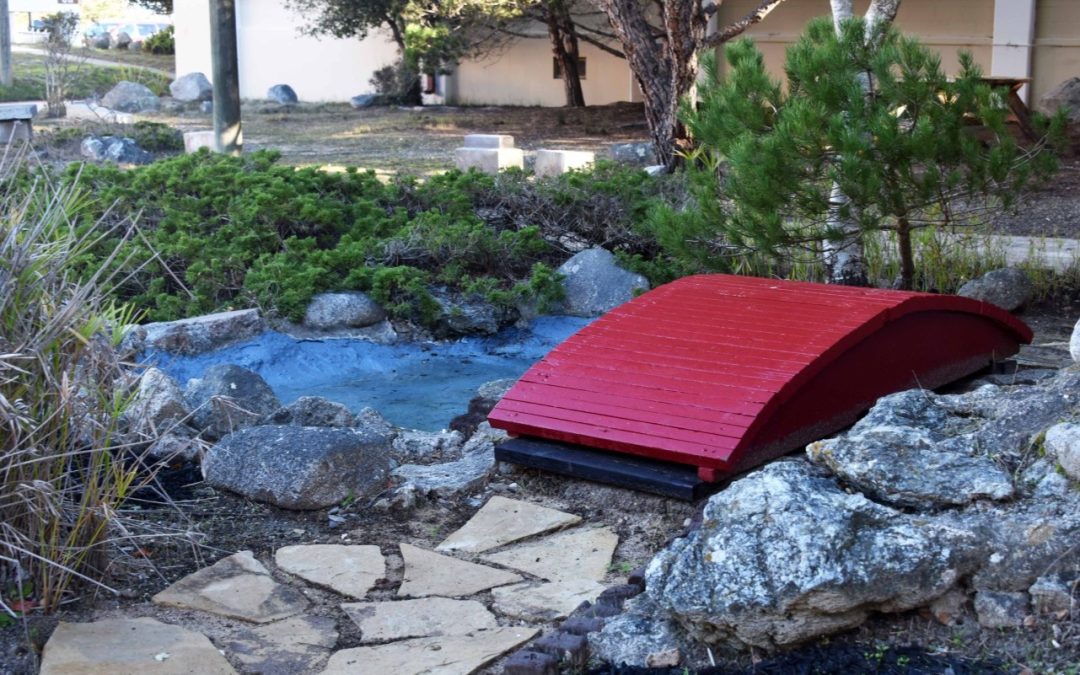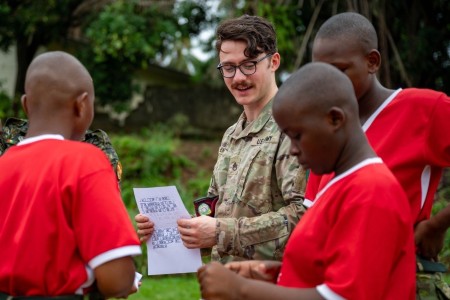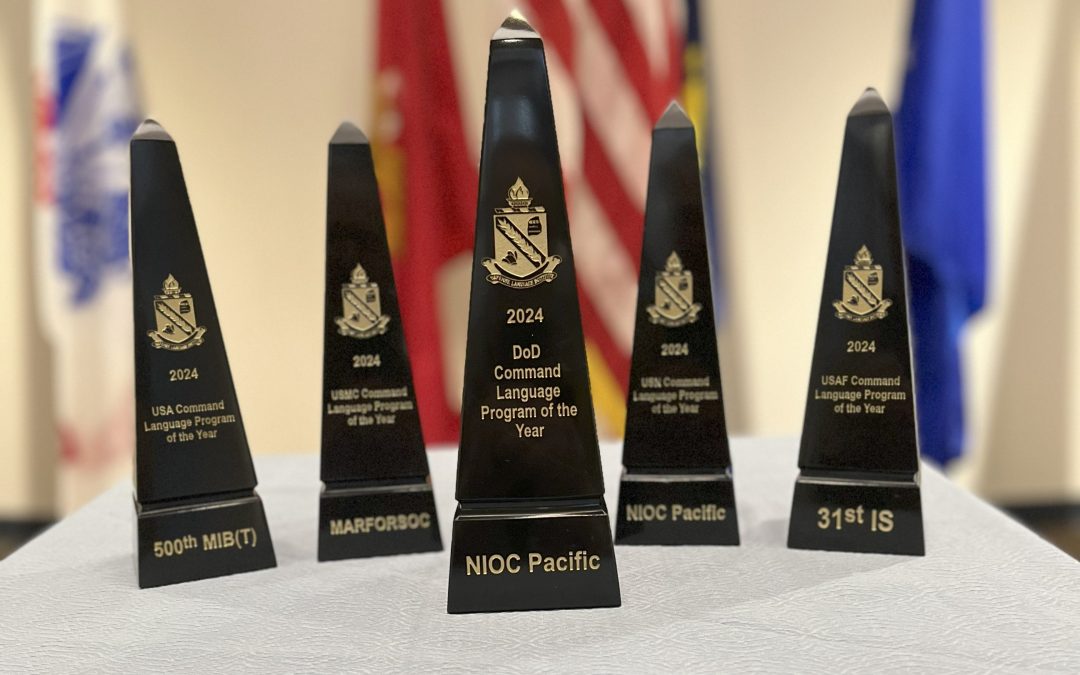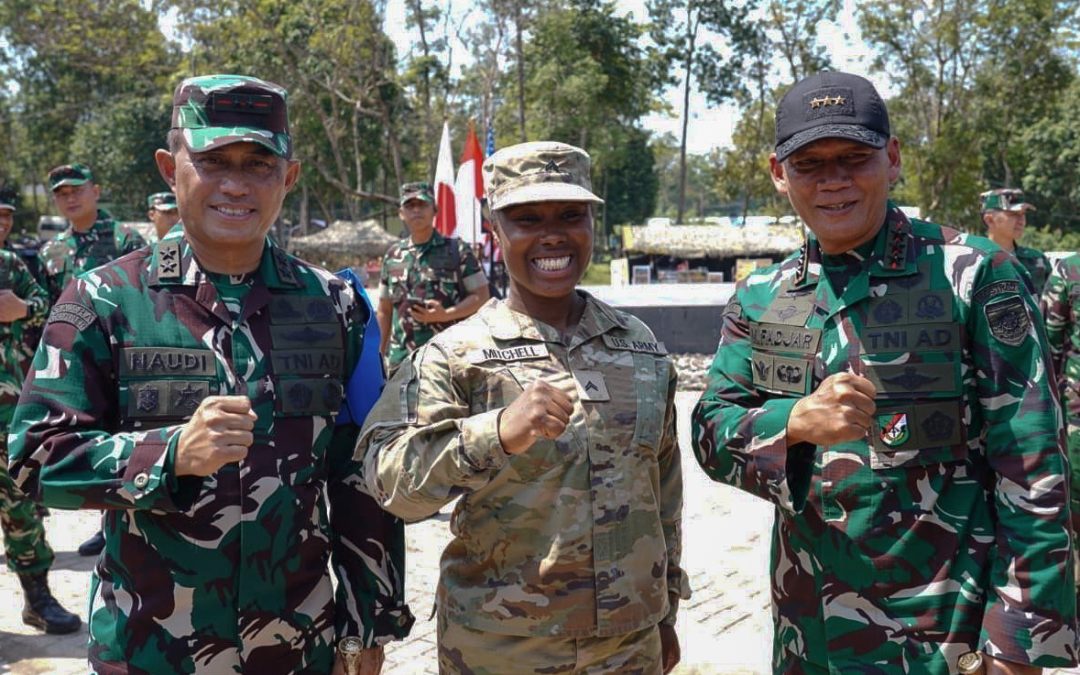By Patrick Bray
DLIFLC Public Affairs
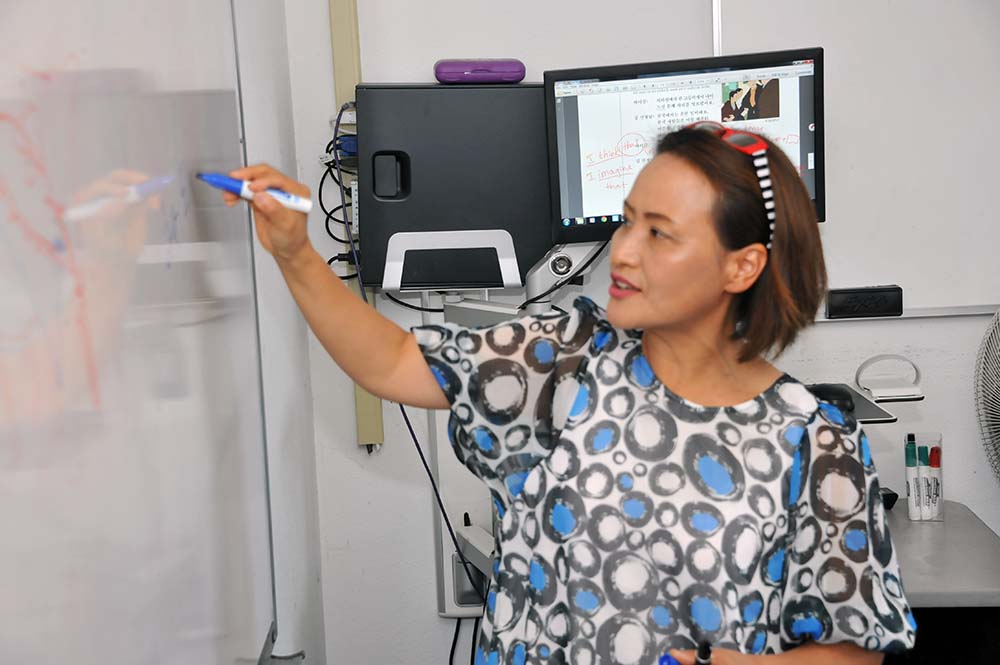
Josephine Petkovski teaches a Korean class Aug. 7 at the Defense Language Institute Foreign Language Center Asian School II, better known as the Korean School. She is also an alumnus of the Institute where she now teaches, having graduated from the Chinese Mandarin course in 2004. (U.S. Army photo by Patrick Bray/Released)
MONTEREY, Calif. – Standing at a height of only four feet, 11 inches, one could be forgiven for thinking that Josephine “Josie” Petkovski may feel intimidated by the military uniforms that surround her every day. Though short in stature, she is not. She has worn two of them as a Veteran of the U.S. Army and U.S. Navy.
Petkovski is a new teacher at the Defense Language Institute Foreign Language Center Asian School II, better known as the Korean School. She is also an alumnas of the Institute where she now teaches, having graduated from the Chinese Mandarin course in 2004.
So, Petkovski knows a thing or two about both learning languages and being in the military.
Originally from Busan, South Korea, she presently resides in San Juan Bautista, California, with her family, husband and a six-year-old daughter. She first visited the U.S. in the 1980s to attend a wedding in Minnesota and visit her relatives in Florida. She then traveled for two months from Colorado to Florida to Chicago by Greyhound bus. Later, she permanently moved to the U.S. in 1990 and in 1991 joined the U.S. Army Reserves, seeking education benefits.
Military life in the fleet and field
“One day I was sitting on the couch in the living room and I saw this commercial – Be all that you can be,” said Petkovski of the Army’s recruiting slogan from 1980 to 2001.
The Army opportunities looked better to her than part-time retail or food service jobs, but when she entered the recruiter’s office he told her that she is “not quite there yet.”
“What does that mean?” she asked.
“Josie, you’re too short,” he replied, after measuring her height three times. The recruiter had to ask for a waiver from the Army for her to join.
Petkovski’s height was her first challenge in joining the military. Her second was getting through Army basic training at Fort Leonard Wood, Missouri.
“I strived to pass basic training because I wanted it so bad,” she said.
After graduation from basic and advanced individual training, also at Fort Leonard Wood, Petkovski became qualified as an 81B technical drafting specialist.
“That job doesn’t exist anymore,” Petkovski said, speaking of the tedious work of drawing technical designs by hand before computer-aided design. “But I loved being in the Army and getting to go to school.”
However, in December 1993 Petkovski left for Germany; spent three years there; and then returned to the U.S. She continued her postsecondary education in the midst of undergoing a few personal ordeals.
“I thought about returning to Busan but my mother said, ‘Josie, you’ve come too far to start over again in Korea,’” she said.
Instead, Petkovski channeled any negative feelings she had into her studies and graduated Magna Cum Laude with a Bachelor of Science in Mathematics from the University of Tennessee, Knoxville. From there she decided to join the active duty Navy.
Petkovski made her decision based on a brief visit to Naval Station Rota, Spain, but also out of her love for the white uniforms, famously featured in the movie “An Officer and a Gentleman” in the 1980s.
“I fell in love with the Navy. I told the navy officer recruiter that I want to travel the world by ship,” said Petkovski.
His reply, “Josie, you’re too short.”
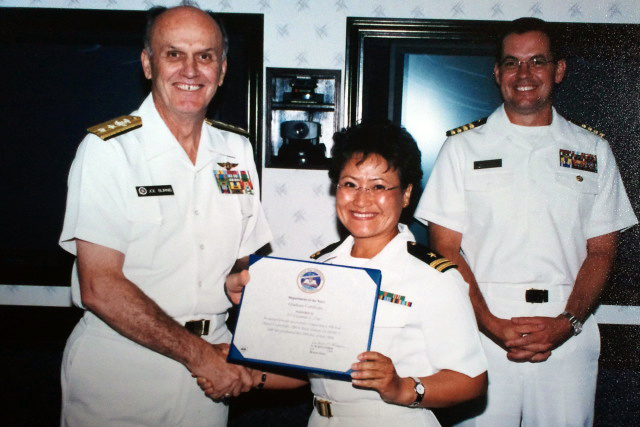
U.S. Navy Lt. Josephine Petkovski proudly shows off her diploma after graduating in Pensacola, Florida. (Photo courtesy of Josephine Petkovski)
At DLIFLC
Despite her height, Petkovski was able to join the U.S. Navy and attended Officer Candidate School in Pensacola, Florida, commissioning in 2000.
Petkovski’s first deployment was as an aviation maintenance duty officer for six months aboard the USS Harry S. Truman. Afterward she was re-designated as a cryptologist, also known as an Information Warfare Officer, and got hand selected for DLIFLC to study Chinese Mandarin. She reported in January 2003.
“I totally underestimated learning Chinese Mandarin,” said Petkovski, having previously studied it in Korea. “I struggled for a good six months.”
Sino Korean is a non-tonal language. Chinese taught in Korea does not utilize tone, which can differentiate the meanings of every single character.
“Not to be really dramatic, but you could mean to say you want to help somebody but really say you’re going to hurt them,” said Petkovski on the importance of getting the right tone.
As an officer she did not want to embarrass herself in front of her classmates who were a U.S. Marine Corps Captain and a U.S. Air Force Special Agent with the rest of the class being enlisted.
“I was very proud of my enlisted classmates, though. Although they had no background in Asian languages, they were amazingly perfecting the language,” Petkovski said. “I admired their endeavor in learning the language.”
Petkovski never thought about quitting though she was studying every night without her grades improving. “As an officer and a section leader the thought never crossed my mind,” she said.
Then one teacher helped Petkovski achieve a breakthrough. She told her that her pronunciation and tone were not correct, but she said so in a constructive way. “So Zhao Laoshi, who is no longer a teacher at DLI, helped me to figure it out.”
From then on, “I could hear Chinese Mandarin and process it in my brain in Korean and then produce an output in English,” Petkovski said as her learning improved.
Overall, she says of her experience as a student was not easy training. “Chinese is not an easy language to learn,” commented Petkovski.
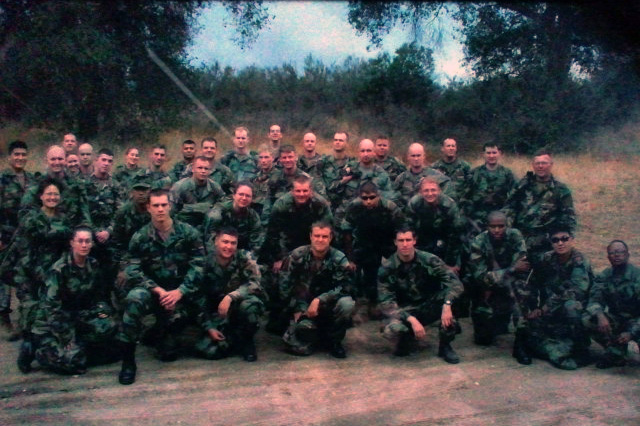
U.S. Navy Lt. Josephine Petkovski (second row, first on left side) poses with her classmates during SERE training in 2004. (Photo courtesy of Josephine Petkovski)
After DLIFLC, Petkovski went on to water survival training and then Survival, Evasion, Resistance, and Escape (SERE) School, but due to the required non-disclosure agreement signed by all students she cannot talk about SERE.
“I have my profound deference to every single POW in my country like Sen. John McCain and Louis Zamperini, a WWII POW who was featured in the movie “Unbroken,” and have a speck of understanding what our POWs might have gone through,” said Petkovski of the SERE experience.
Petkovski went on to Misawa, Japan, to work with Chinese Mandarin linguists. Today, as a Korean teacher she is familiar with the linguist career beyond being a student at DLIFLC.
Petkovski’s maiden name is Cho. She met her husband through a Korean missionary pastor while stationed in Bahrain and took his surname – Petkovski – who is of Macedonian and Danish descendant.
Coming full circle
Petkovski originally applied for her position at DLIFLC in 2011, but was not referred. After she finished her Master’s degree in TESOL, teaching English to speakers of other languages, her adviser at the University of San Francisco said she should reconsider her application. With her Master’s degree in hand it took her only five months to get the job.
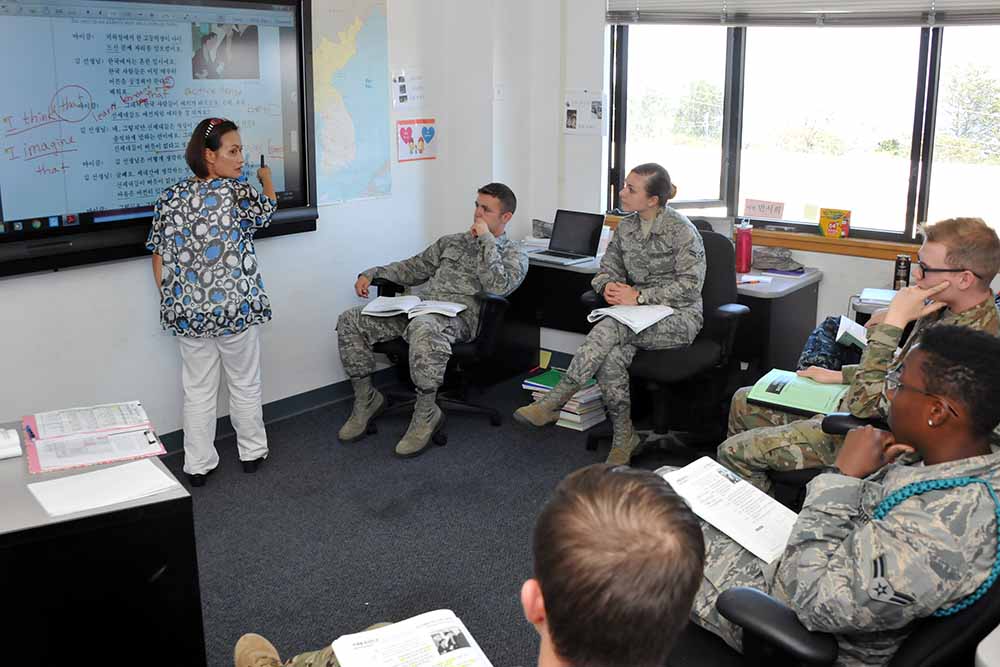
Josephine Petkovski teaches a Korean class Aug. 7 at the Defense Language Institute Foreign Language Center Asian School II, better known as the Korean School. She is also an alumnus of the Institute where she now teaches, having graduated from the Chinese Mandarin course in 2004. (U.S. Army photo by Patrick Bray/Released)
Now Petkovski has just finished her first semester as a Korean teacher. She finds it to be a learning experience for her just as much for the students, referring to an article by Dr. Jeff Duncan-Andrade at San Francisco State University who said that “Teaching is who I am not what I do.”
“I’m learning a lot from my students,” said Petkovski, who is excited to see them graduate in about a year.
“I know my student’s physical and mental struggle. I tell them to work with their teachers if they find themselves struggling, and find balance and manage their time outside of class.”
“I always encourage my motto, PMA – positive mental attitude. I tell them if I can do it, so can anyone.”
Since returning to DLIFLC, Petkovski has reunited with some of her Chinese teachers who welcomed her back and also surprised that she became a teacher. “I am very grateful that I have this opportunity to teach Korean at DLI, albeit not in uniform. I only hope to be an invaluable asset not only to the Korean School but also DLI as a whole.”
***
DLIFLC provides resident instruction in 17 languages at the Presidio of Monterey, California, with the capacity to instruct another 65 languages in Washington, D.C., graduating more than 220,000 linguists since 1941.
In addition, multiple language training detachments exists at sites in the U.S., Europe, Hawaii and Korea spanning all the U.S. geographic combatant commands in support of the total force.

